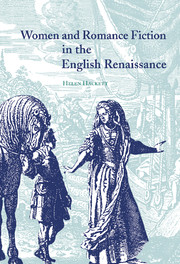Book contents
- Frontmatter
- Contents
- Acknowledgements
- List of abbreviations and a note on the text
- Introduction
- 1 The readership of Renaissance romance
- 2 Renaissance romance and modern romance
- 3 Novellas of the 1560s and 1570s
- 4 Spanish and Portuguese romances
- 5 Fictions addressed to women by Lyly, Rich and Greene
- 6 The ‘Arcadia’: readership and authorship
- 7 The ‘Arcadia’: heroines
- 8 ‘The Faerie Queene’
- 9 Shakespeare's romance sources
- 10 Lady Mary Wroth's ‘Urania’
- Epilogue: The later seventeenth century
- Notes
- Bibliography
- Index
5 - Fictions addressed to women by Lyly, Rich and Greene
Published online by Cambridge University Press: 01 September 2009
- Frontmatter
- Contents
- Acknowledgements
- List of abbreviations and a note on the text
- Introduction
- 1 The readership of Renaissance romance
- 2 Renaissance romance and modern romance
- 3 Novellas of the 1560s and 1570s
- 4 Spanish and Portuguese romances
- 5 Fictions addressed to women by Lyly, Rich and Greene
- 6 The ‘Arcadia’: readership and authorship
- 7 The ‘Arcadia’: heroines
- 8 ‘The Faerie Queene’
- 9 Shakespeare's romance sources
- 10 Lady Mary Wroth's ‘Urania’
- Epilogue: The later seventeenth century
- Notes
- Bibliography
- Index
Summary
I have already briefly discussed in chapters 1 and 2 above the prefaces to John Lyly's Euphues and his England (1580), Barnaby Rich's Farewell to Military Profession and Robert Greene's Penelope's Web (1587). In this chapter I will expand on this discussion, and look at the content of the three authors' fictions, to explore how the idea of fictional prose as an effeminised space became especially prevalent in the 1580s.
LYLY'S EUPHUES ROMANCES
The prefaces to Euphues: The Anatomy of Wit (1578), the work to which Euphues and his England was the sequel, are addressed to male readers. The title page describes the volume as ‘Very pleasant for all Gentlemen to read, and most necessary to remember’. The dedication is to Sir William West, followed by an epistle to gentlemen readers. However, Lyly introduces two key ideas: his readership's foolish preoccupation with fashion; and, catering to this, the inconsequentiality and disposability of his writing. He complains that ‘Englishmen desire to hear finer speech than the language will allow’, and ‘to wear finer cloth than is wrought of wool’ (Euphues, p. 6). For these reasons ‘I am content this winter to have my doings read for a toy that in the summer they may be ready for trash’ (p. 8). The primary meaning of the word ‘trash’ at this time was specifically broken and discarded pieces, like twigs and straw fit only for kindling, but it was already developing the wider figurative sense of simply ‘rubbish’ or ‘nonsense’.
- Type
- Chapter
- Information
- Women and Romance Fiction in the English Renaissance , pp. 76 - 100Publisher: Cambridge University PressPrint publication year: 2000



